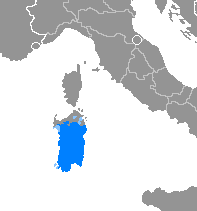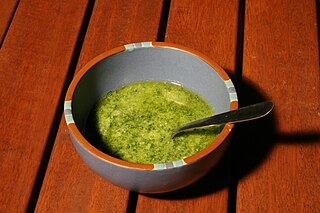| Look up sardo in Wiktionary, the free dictionary. |
Sardo is a hard, grating cow's milk cheese that is similar to Pecorino Romano.
Contents
Sardo may also refer to:
| Look up sardo in Wiktionary, the free dictionary. |
Sardo is a hard, grating cow's milk cheese that is similar to Pecorino Romano.
Sardo may also refer to:
| This disambiguation page lists articles associated with the title Sardo. If an internal link led you here, you may wish to change the link to point directly to the intended article. |

Nuoro is a city and comune (municipality) in central-eastern Sardinia, Italy, situated on the slopes of the Monte Ortobene. It is the capital of the province of Nuoro. With a population of 36,347 (2011), it is the sixth-largest city in Sardinia.

Pecorino Romano is a hard, salty Italian cheese, often used for grating, made with sheep's milk. The name "pecorino" simply means "ovine" or "of sheep" in Italian; the name of the cheese, although protected, is a simple description rather than a brand: "[formaggio] pecorino romano" is simply "sheep's [cheese] of Rome".

Logudorese Sardinian is one of the two written standards of the Sardinian language, which is often considered one of the most, if not the most conservative of all Romance languages. The orthography is based on the spoken dialects of central northern Sardinia, identified by certain attributes which are not found, or found to a lesser degree, among the Sardinian dialects centered on the other written form, Campidanese. Its ISO 639-3 code is src.

Sardinian or Sard is a Romance language spoken by the Sardinians on the Western Mediterranean island of Sardinia.

Pecorino cheeses are hard Italian cheeses made from sheep's milk. The name "pecorino" simply means "ovine" or "of sheep" in Italian.

Campidanese Sardinian is one of the two written standards of the Sardinian language, which is often considered one of the most, if not the most conservative of all the Romance languages. The orthography is based on the spoken dialects of central southern Sardinia, identified by certain attributes which are not found, or found to a lesser degree, among the Sardinian dialects centered on the other written form, Logudorese. Its ISO 639-3 code is sro.
Sardinia is probably the most culturally distinct of all the regions in Italy and, musically, is best known for the tenore polyphonic singing, sacred chants called gosos, the launeddas, an ancient instrument that consists of a set of three single-reed pipes, all three mouth-blown simultaneously using circular breathing, with two chanters and one drone and the cantu a chiterra, a monodic song that is accompanied by guitar, widespread mainly in the center and north of the island.

The Southern Romance languages are a primary branch of the Romance languages.

Pecorino sardo, also known as fiore sardo, is a firm cheese from the Italian island of Sardinia which is made from sheep milk: specifically from the milk of the local Sardinian breed. It was awarded Denominazione d'Origine status in 1991 and granted Protected designation of origin protection in 1996, the year in which this European Union certification scheme was introduced.

Pattada is a comune (municipality) in the Province of Sassari in the Italian region of Sardinia, located about 150 kilometres (93 mi) north of Cagliari and about 50 kilometres (31 mi) southeast of Sassari.

Aritzo is a comune (municipality) in the Province of Nuoro in the Italian region Sardinia, located about 80 kilometres (50 mi) north of Cagliari and about 40 kilometres (25 mi) southwest of Nuoro.

Atzara is a comune (municipality) in the Province of Nuoro in the Italian region Sardinia, located about 90 kilometres (56 mi) north of Cagliari and about 45 kilometres (28 mi) southwest of Nuoro.

Bari Sardo is a comune (municipality) in the Province of Nuoro in the Italian region Sardinia, located about 120 km northeast of Cagliari and about 9 kilometres (6 mi) south of Tortolì.

Belvì is a comune (municipality) in the Province of Nuoro in the Italian region Sardinia, located about 80 kilometres (50 mi) north of Cagliari and about 40 kilometres (25 mi) southwest of Nuoro. It is part of the traditional region Barbagia di Belvì.

Meana Sardo, or Meana in Sardinian, is a comune (municipality) in the Province of Nuoro in the Italian region Sardinia, located about 80 kilometres (50 mi) north of Cagliari and about 45 kilometres (28 mi) southwest of Nuoro. As of 31 December 2004, it has a population of 2,028 and an area of 73.8 square kilometres (28.5 sq mi).

Onifai is a comune (municipality) in the Province of Nuoro in the Italian region of Sardinia, located about 200 kilometres (120 mi) north of Cagliari, about 40 kilometres (25 mi) east of Nuoro and just 5 kilometres (3 mi) inland from the gulf of Orosei. The economy is based on agriculture and shepherding. Onifai is well known for its pecorino cheese and vernaccia wine made with Cannonau grapes. As of 31 December 2004, it had a population of 765 and an area of 43.0 square kilometres (16.6 sq mi).

Pistou, or pistou sauce, is the French translation of the famous Genoese pesto following the annexation of Nice by France in 1860. It's a ligurian cold sauce made from cloves of garlic, fresh basil, and olive oil. It is somewhat same to the Ligurian sauce pesto, although it lacks pine nuts. Some modern versions of the recipe include grated parmesan, pecorino, or similar hard cheeses.
The cuisine of Sardinia is the traditional cuisine of the island of Sardinia, and the expression of its culinary art. It is characterised by its own variety, and by the fact of having been enriched through a number of interactions with the other Mediterranean cultures while retaining its own identity. Sardinia's food culture is strictly divided into food from the land and food from the sea, reflecting the island's historical vicissitudes and especially its geographic landscapes, spacing from the coastline to the ragged mountains of the interior. The Sardinian cuisine is considered part of the Mediterranean diet, a nutritional model that was proclaimed by UNESCO as an intangible cultural heritage.
Sardi or SARDI may refer to: